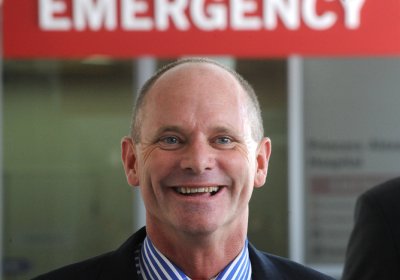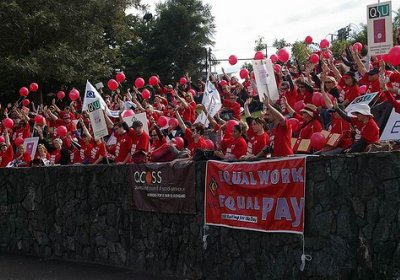The People’s Bill, an initiative of the Lock the Gate Alliance to oppose the growing coal seam gas and coal industries, was launched in Brisbane on September 4.
The People’s Common Rights and Provisions Bill 2014 would amend the Mineral Resources Act to give land holders, local governments, Aboriginal communities and others the power to deny mining companies access to their land.
Margaret Gleeson
While Prime Minister Tony Abbott sealed a deal in New Delhi to export uranium to India, the Queensland government granted six mining development leases to two companies on September 5.
No uranium has been mined in Queensland since 1982 and has been banned since 1989. However in October 2012 the QLD government lifted the mining ban.
Summit Resources was granted four of the mining development leases and Fusion resources were granted two. The leases cover areas near Mount Isa and are the latest stage in Premier Campbell Newman’s plan for the uranium industry.
About 150 people rallied outside the home of Sheila Oakley in the Brisbane suburb of Logan on February 15.
Oakley was tasered in the eye by police outside her home on February 6. She has been hospitalised and will suffer permanent disability.
The rally marched from her home to Logan police station to hand over a petition calling for an urgent investigation into the incident, to be carried out by an independent body including Aboriginal and Torres Strait Islander representatives.
Under the guise of “law and order” and protecting the community from “criminal bikie gangs” Queensland Premier Campbell Newman has passed new laws that have implications for the civil rights of the wider community.
The Liberal-National Party used their majority to rush the laws through parliament on October 17. The Vicious Lawless Association Disestablishment Bill, Tattoo Parlours Bill and the Criminal Law Amendment Bill specifically target bikies.
About 300 students from the Paraguayan National University and the private Catholic University marched to the national police headquarters in Asuncion on October 25 to protest the new Law of Higher Education (LES).
The law passed through the lower house of the Paraguayan Congress three weeks earlier, and is currently before the Upper House.
During the protest, Romilio Gonzalez and Johana Orihuela, members of the Popular University Movement, spoke to Green Left Weekly.
“This is one of a number of actions we are carrying out,” Orihuela said.
A day after the Queensland Liberal National Party (LNP)’s slash-and-burn budget was handed down, huge union rallies — the biggest since the campaign against the Howard government’s Work Choices laws — took place on September 12.
Ten thousand workers marched on parliament house in Brisbane, and marches and rallies were also held in several regional centres, such as Townsville, Cairns, Mackay, Rockhampton, Bundaberg, the Sunshine Coast, Toowoomba and the Gold Coast.
The Liberal-National Party government announced a swathe of new job cuts on September 7 before its first budget on September 11. Queensland Health has been the latest victim, with 2700 jobs set to be dusted.
This has again outed Premier Campbell Newman as a fraud and cheat. His previous claims that regional centres would not bear the brunt of his public sector pruning and that front line services would be off limits have been rendered meaningless.
The September 3 Townsville Bulletin said the city had suffered 550 job losses since Newman came to power.
Forty years after the first equal pay test case, the gap between male and female wages continues to widen.
Australian Bureau of Statistics figures, released on May 20, 2010, put the pay gap (as of February 2010) at 18%. Women on average now earn $239.30 a week less than men. The pay gap increased 0.5% over the past quarter (from 17.5%) and 1.5% over the past year (from 16.5%).
The gap is now at its highest level since August 1994. This pay gap means, on average, Australian women have to work an extra 66 days to earn the same as men.
There has been intense activity in 2011 around the social and community services pay equity wage case pursued by the Australian Services Union (ASU) and four other unions.
The claim, which was lodged in March 2010, is rapidly approaching its conclusion.
Since late January 2011, there has been:
• A new round of site visits, during which members of the Fair Work Australia tribunal hearing the case visited public sector workplaces to see how the work compared to that in the non-government sector.
Tens of thousands rallied around Australia on June 10 in support of the Australian Services Union’s (ASU) pay equity test case for community sector workers.
The ASU has opened a test case with Fair Work Australia under the equal remuneration power of the Fair Work Act. The ASU claim is for pay rises of about 25% for community sector workers. It follows a successful application in the Queensland Industrial Relations Commission last year.
On May 6, 2009, the Queensland Industrial Relations Commission (QIRC) made a landmark decision on pay equity that acknowledged the chronic undervaluation of women’s work in Queensland's community services sector. It awarded pay rises of between 18% and 37% to the workers concerned — 80% of whom were women.
Hundreds of community workers and members of the social and community services (SACS) division of the Queensland Services Union (QSU) rallied on November 10 outside the Queensland Industrial Relations Commission (QIRC).
- Previous page
- Page 15
- Next page






